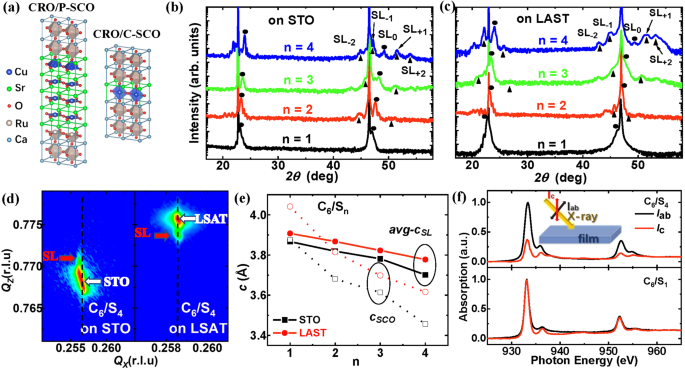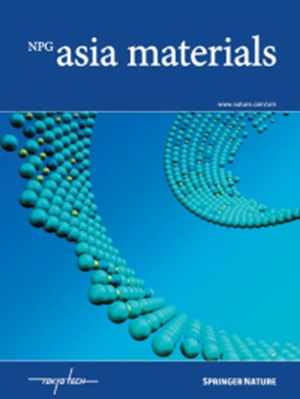CaRuO3/SrCuO2 超晶格中界面耦合诱导铁磁性的尺寸控制
IF 8.3
2区 材料科学
Q1 MATERIALS SCIENCE, MULTIDISCIPLINARY
引用次数: 0
摘要
由于界面上多个自由度的强烈相互作用,电子相关氧化物异质结构为创造奇异的量子态提供了一个前景广阔的平台。了解和控制氧化物界面的耦合效应是设计具有所需功能的新兴界面相的先决条件。在此,我们报告了对包晶-CaRuO3/无限层-SrCuO2 超晶格中界面耦合诱导铁磁(FM)相的尺寸控制。结构分析表明,随着层厚度的增加,SrCuO2 层会发生链型到平面型的结构转变。霍尔和磁阻测量结果表明,当 CaRuO3 层靠近链式 SrCuO2 层时,原本顺磁的 CaRuO3 层出现了界面调频态;这种超晶格的居里温度最高,约为 75 K,并且具有垂直磁各向异性。随着 SrCuO2 层的厚度驱动结构转变,界面调频秩序逐渐恶化并最终消失。正如 X 射线吸收结果所示,CaRuO3/链-SrCuO2 和 CaRuO3/平面-SrCuO2 界面的电荷转移是不同的,这导致了界面磁态的尺寸控制。我们的研究结果可用于促进一种新方法,以操纵氧化物异质结构中的界面耦合并创建新出现的界面相。本文章由计算机程序翻译,如有差异,请以英文原文为准。


Dimensional control of interface coupling-induced ferromagnetism in CaRuO3/SrCuO2 superlattices
Due to the strong interactions from multiple degrees of freedom at the interfaces, electron-correlated oxide heterostructures have provided a promising platform for creating exotic quantum states. Understanding and controlling the coupling effects at the oxide interface are prerequisites for designing emergent interfacial phases with desired functionalities. Here, we report the dimensional control of the interface coupling-induced ferromagnetic (FM) phase in perovskite-CaRuO3/infinite-layered-SrCuO2 superlattices. Structural analysis reveals the occurrence of chain-type to planar-type structural transitions for the SrCuO2 layer as the layer thickness increases. The Hall and magnetoresistance measurements indicate the appearance of an interfacial FM state in the originally paramagnetic CaRuO3 layers when the CaRuO3 layer is in proximity to the chain-type SrCuO2 layers; this superlattice has the highest Curie temperature of ~75 K and perpendicular magnetic anisotropy. Along with the thickness-driven structural transition of the SrCuO2 layers, the interfacial FM order gradually deteriorates and finally disappears. As shown by the X-ray absorption results, the charge transfer at the CaRuO3/chain-SrCuO2 and CaRuO3/plane-SrCuO2 interfaces are different, resulting in dimensional control of the interfacial magnetic state. The results from our study can be used to facilitate a new method to manipulate interface coupling and create emergent interfacial phases in oxide heterostructures. Perovskite transition-metal oxides, known for their complex electron interactions, exhibit unique physical properties like superconductivity and magnetoresistance. However, layering these materials can result in new, unexpected behaviors at their interfaces. This study focuses on a layered structure of perovskite ruthenate and strontium cuprate. The research shows that by controlling the thickness of SCO layers in CRO/SCO superlattices, it is possible to induce ferromagnetism in CRO, which normally does not exhibit this property. The authors conclude that this manipulation of interface coupling can lead to new interfacial phases with potential applications in spintronics. The findings open up possibilities for future research into the control of quantum phases in complex oxide materials. This summary was initially drafted using artificial intelligence, then revised and fact-checked by the author. In this paper, we report the dimensional control of the interface coupling-induced ferromagnetic phase in perovskite-CaRuO3/infinite-layered-SrCuO2 superlattices. The Hall and magnetoresistance measurements indicate the appearance of an interfacial ferromagnetic state in the originally paramagnetic CaRuO3 layers when the CaRuO3 layer is in proximity to the chain-type SrCuO2 layers; this superlattice has the highest Curie temperature of ~75 K and perpendicular magnetic anisotropy. Along with the thickness-driven structural transition from chain-type to planar-type of the SrCuO2 layers, the interfacial ferromagnetic order gradually deteriorates and finally disappears.
求助全文
通过发布文献求助,成功后即可免费获取论文全文。
去求助
来源期刊

Npg Asia Materials
MATERIALS SCIENCE, MULTIDISCIPLINARY-
CiteScore
15.40
自引率
1.00%
发文量
87
审稿时长
2 months
期刊介绍:
NPG Asia Materials is an open access, international journal that publishes peer-reviewed review and primary research articles in the field of materials sciences. The journal has a global outlook and reach, with a base in the Asia-Pacific region to reflect the significant and growing output of materials research from this area. The target audience for NPG Asia Materials is scientists and researchers involved in materials research, covering a wide range of disciplines including physical and chemical sciences, biotechnology, and nanotechnology. The journal particularly welcomes high-quality articles from rapidly advancing areas that bridge the gap between materials science and engineering, as well as the classical disciplines of physics, chemistry, and biology. NPG Asia Materials is abstracted/indexed in Journal Citation Reports/Science Edition Web of Knowledge, Google Scholar, Chemical Abstract Services, Scopus, Ulrichsweb (ProQuest), and Scirus.
 求助内容:
求助内容: 应助结果提醒方式:
应助结果提醒方式:


